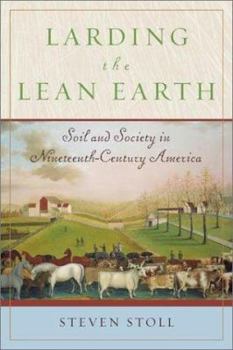Larding the Lean Earth: Soil and Society in Nineteenth-Century America
Select Format
Select Condition 
Book Overview
A major history of early Americans' ideas about conservation Fifty years after the American Revolution, the yeoman farmers who made up a large part of the new country's voters faced a crisis. The very soil of American farms seemed to be failing, and agricultural prosperity, upon which the Republic was founded, was threatened. Steven Stoll's passionate and brilliantly argued book explores the tempestuous debates that erupted between "improvers," who believed in practices that sustained and bettered the soil of existing farms, and "emigrants," who thought it was wiser and more "American" to move westward as the soil gave out. Stoll examines the dozens of journals, from New York to Virginia, that gave voice to the improvers' cause. He also focuses especially on two groups of farmers, in Pennsylvania and South Carolina. He analyzes the similarities and differences in their farming habits in order to illustrate larger regional concerns about the "new husbandry" in free and slave states. Farming has always been the human activity that most disrupts nature, for good or ill. The decisions these early Americans made about how to farm not only expressed their political and social faith, but also influenced American attitudes about the environment for decades to come. Larding the Lean Earth is a signal work of environmental history and an original contribution to the study of antebellum America.
Format:Hardcover
Language:English
ISBN:0809064316
ISBN13:9780809064311
Release Date:July 2002
Publisher:Hill & Wang
Length:287 Pages
Weight:1.26 lbs.
Dimensions:1.1" x 6.2" x 9.2"
Customer Reviews
2 ratings
The debate over natural resource management
Published by Thriftbooks.com User , 22 years ago
Farming occupied the majority of American pursuits in the 19th century, tied up most of the nation's capital, and occupied the thoughts of farmers and politicians alike. Before expansion into the West could succeed, conservation of land and resources would have to be taken into account: Larding The Lean Earth points out that the debate over natural resource management began in the 1820s and pitted farmers against plantation owners in a conflict which would affect westward expansion processes as a whole.
Larding the Lean Earth
Published by Thriftbooks.com User , 22 years ago
When we think of the conservation movement in America, our minds are drawn to people such as John James Audubon, John Muir, Henry David Thoreau, and Aldo Leopold. Although these men wrote with passion about conservation, the political movement had deeper roots. In his original and thought provoking book, Steven Stoll proposes that conservation thought emerged as a political force in the 19th century exploitation of the land. Two forces emerged - the improvers of the land who believed that farming practices must be used to sustain the soil, - and the emigrants who kept moving to new untouched wilderness as their land gave out. Today, most of the arable land is cultivated and much of it in North America is maintained by technology. Larding the Lean Earth explores how technology has come to dominate the agricultural landscape. It is a must read for anyone interested in the history of conservation, and anyone close to the land.






